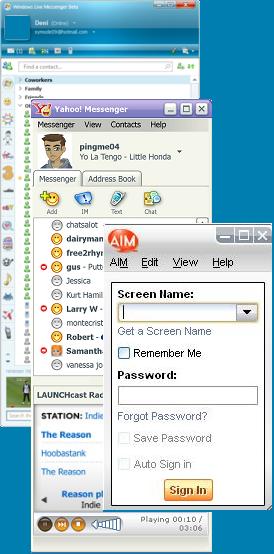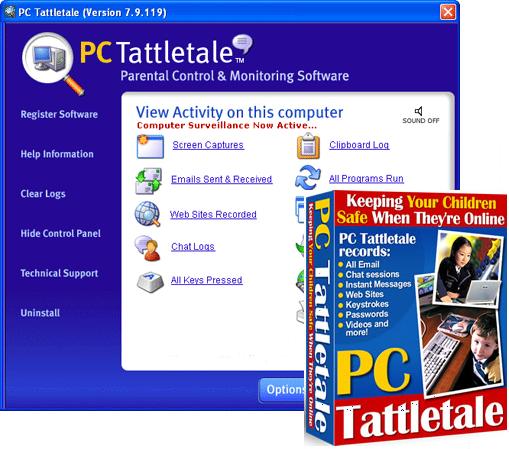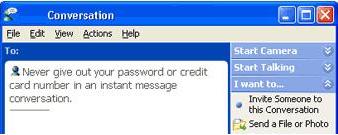Courses/Computer Science/CPSC 203/CPSC 203 2007Summer L60/CPSC 203 2007Summer L60 TermProjects/Don't Shoot the Messenger?
Contents
Don't Shoot the Messenger?
Presentation by: Omar Khan, Karli Mergen, Aletheia Vito, and Adebola Adeogun
Initial Project Statement
While the issue of free speech in regards to monitoring Instant Messaging programs is a multifaceted and complex one, the benefits of such monitoring to society outweigh the detriments to free speech, and as such, the monitoring of Instant Messaging conversations is a positive step for society to take.
Background to Instant Messaging Programs
What is Instant Messaging?
Instant Messaging (IM) is an internet program that allows users to communicate online by sending messages back and forth in real-time.
History of Instant Messaging
Since the Internet was developed more and more people were starting to use the internet. Soon after, IM programs were created. In 1996, Four Israeli programmers who started a company called, Mirablis, released ICQ, the very first IM program. Most users inmmidiately switched from online bulletin boards to using IM, because it allows them to use the same software to communicate in real-time. After ICQ, more IM programs were created, like AOL, MSN, YAHOO MESSENGER and more. It is faster and more efficient than using emails.
Purpose of Instant Messaging
IM was created to:
- To allow users to communicate with each other in real-time.
- To share, and trade files and documents faster and easier through the Web.
- People who are far apart can communicate better.
- Cheaper way of communication
How Instant Messaging Programs Work
First, the a IM software must be installed on the user's computer. An user's account must be created and registered. IM's interface allows its user to see other IM users that are online in the list of people that have been added on the user's contact list. To talk to online users, a chatting window must be opened. The window allows the users to send messages to each other, send files , and even open a web cam conversation. Since, IM first came out a lot of alterations to it has been done to make it more convenient and effective. New features such as, playing games with your friends, talking online, web cam, emotions and more has been added to make it more appealing.
MSN EMOTIONS:





Are People Monitored Over IM Programs?
Case Studies
Instant Messaging conversations are being monitored on a daily basis. Over the years, various forms of monitoring of instant messaging conversations have arisen, from simple conversation histories available to anyone for the purpose of looking over their old conversations, to programs specifically meant to watch other people. Some examples of devices used to control and/or monitor IM conversations:
- PC Tattletale: Records all incoming and outgoing messages sent via an instant messaging program, and saves them for viewing later.
- Parental Control Software: Disables many IM and chat features that could otherwise be used to deliver inappropriate material. Can also be used to limit online time to a certain number of hours each day.
- Other IM Monitoring Programs: Many other programs are in place in homes and at workplaces, either watching IM conversations, controlling them, or both. The IT departments of most corporations spend a great deal of time and effort on increasing productivity – controlling IM conversations, while still allowing them to be used as an effective communication pathway, is quite a challenge.
Another interesting development is a bill that was proposed by a Republican Congressman in February 2007, which would require Internet Service Providers (ISPs) to record all email and Instant Messaging activity for all of their Internet users. ISPs which fail to record all of the email and IM records would face hefty fines and prison terms of up to one year for their executives. This bill was dubbed the "SAFETY (Stopping Adults Facilitating the Exploitation of Today's Youth) Act" by Congressman Lamar Smith of Texas.
However, the concept of monitoring IM conversations also poses numerous problems for corporations and people all over the world. We will now examine these negative aspects of IM monitoring, along with the positives, in more detail.
Positive Aspects of IM Monitoring
Curbing Criminal Activity
- As more and more people are using IM in their everyday lives, so are law enforcement agencies. In Nebraska, a man was arrested for an alleged sexual assault on a 10 year old boy, because of a recent IM conversation he had with the boy. The suspect incriminated himself by asking the victim if he had told anyone about them having sex. It is because of this evidence (the recorded conversation) that police were able to arrest him.
- Another recent case was that of a 17 year old boy in Ontario, who has been arrested because of threats he made against two girls over MSN Messenger. Police say that this type of cyberspace bullying is on the rise, and with these conversations being monitored and stored this bullying can be stopped.
- Police are utilizing IM directly to catch people who are hunting for children online. By having officers pose as young people on different IM services they are able to track down and arrest many people involved in child abuse. Many of these people would be otherwise unknown to police. Some people have claimed that this is entrapment, but if you aren't doing anything wrong you have nothing to worry about, and this is an obvious step in the right direction.
Instant Messaging in the Workplace
- Only 25% of companies have an official policy for IM at work, and over 80% of messaging at work is done over public IM services, leading to some serious risks for many companies. This is an open door for hackers who can then steal confidential information or spread worms and viruses. The monitoring of IM at work could help alleviate these security threats, and also ensure people are working, not chatting.
- Most IM that takes place in the workplace is actually personal. This can be dramatically decreased simply through the implementation of a policy of recording and storing conversations, provided this policy is known to employees. This can be accomplished by setting up a more business oriented IM program that works on the company's secure network. These programs have archiving, auditing, authentication and encryption capabilities that many of the public programs lack. By increasing the security that is available many companies can benefit from the speed and convenience of IM, and its usefulness as an immediate communication vehicle.
- In addition to this, employees themselves can exploit IM programs to share stolen corporate information. Yahoo! recently launched a lawsuit against a few of its former employees who were accused of leaking corporate secrets. The principal evidence in this court trial were the IM conversation histories of the employees, where they discussed the information they had stolen and leaked.
Negative Aspects of IM Monitoring
Monitoring of any type of activity brings to mind George Orwell's 1984 - the image of a society where the government ulimately has complete and utter control over the way people think. Is the monitoring of Instant Messaging transforming our society into Oceania? Probably not. But there are definitely negative implications of having 'Big Brother' watching our Instant Messaging conversations.
Invasion of Privacy
One of the features of most instant messaging systems is the ability to record and store conversation histories. While this feature can be useful for recalling information that was mentioned in an IM conversation that occurred two weeks ago, it also poses very real privacy issues.
Firstly, the person you are having a conversation is not necessarily aware that the entire conversation is being recorded. So what happens if that person says something they don't want repeated? Or if they say something about someone else, which then at a later time could be used against them?
That's exactly what happened to a VP at a US-based company, whose computer was hit by a virus that e-mailed his conversation histories to every contact on his Instant Messaging program. As a result of this, negative comments he had made regarding colleagues (in what he thought were private conversations) were read by everyone at his workplace. The VP was then fired as a result of this virus.
Secondly, what if someone hacked into your personal conversation records? In March 2001, a hacker got into the computer of the CEO of eFront, and posted all of the conversations on the Internet. As a result of this, the CEO has been on the receiving end of possible legal action, and more dangerously, death threats.
YouTube Video showing a program where you can hack into MSN Messenger accounts
As you can tell, the negative consequences of IM monitoring has the potential to be very serious. As a result of this, many IM programs (such as MSN Messenger) have a warning at the beginning of IM conversations, warning people not to give out passwords or other sensitive private information in an IM conversation.
Summary
The following table summarizes both the positive and negative aspects of IM Monitoring, and assigns a score based on the importance of each aspect. The total positive scores and negative scores were then summed, giving a weighting to each. As you can see, the positive aspects of IM Monitoring had a higher total score than the negative aspects.
| Aspect | Positive or Negative | Score | Rationale |
|---|---|---|---|
| Catching Criminals | Positive | +5 | Increases public safety; Peace of mind |
| Increasing Productivity | Positive | +3 | Increasing productivity is very important; but not completely due to IM. |
| Conversation Histories | Negative | -2 | While it is potentially a privacy issue, most people are aware of the ability to record all conversations. |
| Hackers and Viruses | Negative | -4 | This is a very serious threat, but warnings and general knowledge are making this type of problem more rare. |
| Totals | Positive | +8 | |
| Totals | Negative | -6 |
Conclusion
The monitoring of IM conversations has large implications on both security and privacy. While monitoring people's IM conversations may indeed impair their privacy, and does hinder their free speech, the benefits of IM monitoring in terms of increasing societal security through capture of criminals, in addition to the benefit of increased productivity in the workplace, serve to outweigh the negatives.
References
- What is Instant Messaging?
- Monitoring of Instant Messaging Programs
- Positive Aspects of IM Monitoring
- Negative Aspects of IM Monitoring
External Links
- More information on Instant Messaging Programs
- MSN Messenger
- Yahoo! Messenger
- AIM
- History of MSN Messenger
- How AIM Works
- Are You Web Aware? - Instant Messaging
- A scientific study into the use of IM Programs to help build solid relationships between coworkers
- Advantages and Disadvantages of IM Programs
- Features of MSN Messenger
- Important Questions Regarding Instant Messaging That YOU Should be Asking
- How IM Works
- Intermediate Level Explanation of How IM Works (Deeper than presentation)
- General Information on IM Monitoring
- (More) Positive Aspects of IM Monitoring
- Instant Messaging Statistics
- Interesting Information


